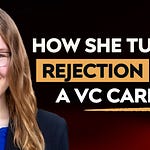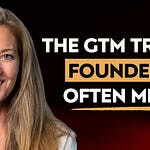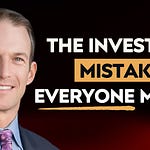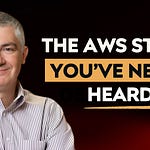What do animated rabbits, quant trading, and $10 million Kickstarter campaigns have in common? If you’re Benjamin Bryant, they’re not just footnotes—they’re foundational chapters in a career that’s reshaped how venture capital can work.
On this week’s episode of The Ignite Podcast, we sat down with Benjamin Bryant—former engineer, founder, and now one of the most prolific early-stage investors backing YC startups through AngelList’s Demo Day Funds. His eclectic background reads more like a script than a resume: visual effects at Warner Bros, building high-frequency trading systems, co-founding music startup Earbits, helping Pebble become a Kickstarter legend, and now managing a portfolio of over 480 companies.
Here’s what we uncovered from our conversation—a deep dive into the art, science, and philosophy behind one of venture’s most unconventional minds.
🎬 From Hollywood to Hedge Funds
Benjamin's journey began at the unlikely intersection of film and computer science. After packing up his car to work on Looney Tunes: Back in Action, he pivoted into 3D printing, then into the high-octane world of quant finance, building early HFT systems and trading FX in London.
That nonlinear career wasn’t planned. “I just said yes to random ideas,” Benjamin admits. But each chapter gave him a new lens on systems, speed, and scale—crucial tools for the chaotic world of startups.
📟 Pebble, Kickstarter, and the Search for Traction
Before Benjamin became a backer, he was a builder. His first real taste of the startup rollercoaster came with Earbits, a music marketing platform that made it into Y Combinator—but never broke through. Then came Pebble. The smartwatch startup raised over $10 million on Kickstarter, kickstarting (pun intended) a new era of consumer hardware.
“Pebble was the first time I felt what real traction was,” Benjamin recalls. “It wasn't about figuring out how to sell—it was about trying to keep up with demand.”
That contrast—between grinding and flying—shaped his understanding of product-market fit, timing, and the brutal truth that “success today doesn’t predict success tomorrow.”
💸 Building AngelList Demo Day Funds: A Fund Like a Startup
After Pebble, Benjamin didn’t head to a cushy VC job. Instead, he hacked venture like a founder. He launched the first AngelList Demo Day Fund in 2017—just two weeks before YC Demo Day—by cold-emailing his London Business School network.
His thesis: YC startups are special, but most investors lack access. So why not build a vehicle that gives LPs a slice of the entire batch?
What started as an experiment is now a repeatable engine: quarterly funds, 25–30% of each YC cohort, with a hyper-systematized approach to sourcing, evaluating, and constructing a venture-scale portfolio.
📊 The Math Behind the Madness: Portfolio Construction as Competitive Edge
Benjamin’s approach to venture is rooted in statistical thinking. He doesn’t just believe in power laws—he builds systems around them.
“Missing a winner hurts more than betting on three losers,” he says. “Your job is to find the vein of silver—and keep digging.”
He argues that most venture firms are under-diversified, making 15–20 bets when math says you need many more to reliably hit outliers. With nearly 500 startups in his portfolio, his model leans into volume, variance, and velocity—while still applying sharp filters on founder quality and product timing.
🎯 Evaluating Startups: What Really Matters
With dozens of investments per batch, how does Benjamin choose? It’s not magic—it’s modeling.
He triangulates from multiple signals:
Founder insight and mental models
Stage-appropriate traction or signals
Sector relevance and timing
Pattern recognition from hundreds of past investments
His take: traction matters, but isn’t predictive. Being “hot” on demo day isn’t the same as being enduring. And yes, late bloomers often outperform.
“You’re a search function,” he says. “Your startup is a search function today, and it’ll be a different one two years from now.”
🌊 From Waves to Wisdom: Personal Lessons from Startup Chaos
Benjamin sees building companies—and building a fund—as emotionally and operationally identical. He likens it to surfing: you paddle through crashing waves until you find the one that carries you.
There’s also a dose of humility: “You think it can’t get worse—and then it does. But if you keep going, you’ll make it through.”
This mindset makes him an unusually empathetic investor, especially to first-time founders. He knows what it’s like to hire executives too early, burn out, or pivot endlessly. That’s part of why founders seek him out—not just for capital, but for perspective.
🧠 Final Takeaways: Lessons for Founders and VCs
Startups are hard. Really hard. The only way to truly understand is to live it.
Traction is real—but so is timing. Pebble worked because Kickstarter was new, not just because it was a great product.
Risk is not a bug—it’s the feature. Embrace the power law, diversify aggressively, and keep playing long enough to get lucky.
Volume unlocks value. With enough surface area, you build networks, reputation, and serendipity.
Venture is a game of pattern recognition—but only if you’ve seen enough patterns.
🎤 Why This Episode Matters
Benjamin Bryant isn’t your typical investor. He didn’t follow the analyst-to-associate track. He built things, broke things, and now backs hundreds of founders trying to do the same.
If you’re a founder navigating the early chaos or an aspiring investor trying to find your edge, Benjamin’s story offers something rare in venture: a brutally honest look at what it actually takes—and a reminder that the best builders don’t always color inside the lines.
👂🎧 Watch, listen, and follow on your favorite platform: https://tr.ee/S2ayrbx_fL
🙏 Join the conversation on your favorite social network: https://linktr.ee/theignitepodcast
Chapters:
Welcome & Benjamin Bryant Introduction (00:01 – 00:40)
From Visual Effects to Quant Finance (00:41 – 02:35)
The Pebble Story: Crowdfunding and Product-Market Fit (02:36 – 06:55)
Lessons from the Smartwatch Wars (06:56 – 09:46)
From Founder to Investor: Bridging Both Worlds (09:47 – 12:27)
How Product Fits Into Investment Risk (12:28 – 15:01)
Pattern Recognition and Founders with “It” (15:02 – 17:59)
Art vs. Science in Venture Capital (18:00 – 24:52)
Building the AngelList Demo Day Funds (24:53 – 33:30)
The Power of Portfolio Construction (33:31 – 42:31)
Hot Deals, Hype, and Founder-VC Dynamics (42:32 – 48:54)
Evaluating YC Startups at Scale (48:55 – 01:06:55)










